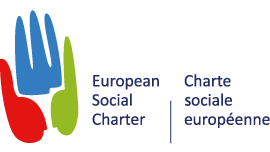High-level Conference on the European Social Charter

Turin, 17-18 October 2014

A high-level Conference on social rights: in the context of the Italian Presidency of the European Union, and with the co-operation of the City of Turin, the Council of Europe held an event at the city’s Teatro Regio on 17 and 18 October focusing on the European Social Charter, an instrument which provides Europe with a true social constitution.
The Charter establishes a system of legal standards which help to reduce economic and social tensions while facilitating sustainable and mutually beneficial development in the States Parties.
The main aim of the Conference was to bring together European policy-makers and reaffirm the importance of social rights in times of crisis.
The main subjects discussed at the Conference
Austerity measures in times of crisis: impact on social rights, participation by citizens, and the European Social Charter’s contribution to overcoming the crisis;
The contribution made by the Social Charter’s collective complaints procedure to respect for social rights in Europe;
Synergies between the law of the European Union and the European Social Charter. (more...)
Documents relating to themes and panels
- Statement of the Secretary General of the Council of Europe on austerity 2014
- Information note on the collective complaints procedure
- Working document of the European Committee of Social Rights on the “Relationship between European Union law and the European Social Charter” 2014
- Press release
- Programme
- List of participants
- General report of the Conference
Speeches and statements delivered on the occasion of the Conference
Friday 17 October 2014
OPENING SESSION:
Giuliano Poletti, Minister of Labour and Social Policies of Italy
Thorbjørn Jagland, Secretary General of the Council of Europe
Piero Fassino, Mayor of Turin
THEME I: THE ROLE OF THE EUROPEAN SOCIAL CHARTER IN AFFIRMING SOCIAL RIGHTS DURING THE CRISIS PERIOD AND THE CRISIS EXIT PHASE
MINISTERIAL SESSION 1
Salim Muslumov, Minister of Labour and Social Protection of the Population of Azerbaijan, on behalf of the Chairmanship of the Committee of Ministers of the Council of Europe
László Andor, European Commissioner responsible for Employment, Social affairs and Inclusion
Antonio Tajani, First Vice-President of the European Parliament
Algimanta Pabedinskiene, Minister of Social Security and Labour, Lithuania
Faruk Çelik, Minister of Labour and Social Security, Turkey
Sergey F. Vel'myaikin, First Deputy Minister of Labour and Social Protection, Russian Federation
Radoslaw Mleczko, Undersecretary of State, Ministry of Labour and Social Policies, Poland
Saturday 18 October 2014
Opening speech by Anne Brasseur, President of the Parliamentary Assembly of the Council of Europe
THEME II: THE IMPLEMENTATION OF SOCIAL RIGHTS IN EUROPE
MINISTERIAL SESSION 2
Michaela Marskova, Minister of Labour and Social Affairs, Czech Republic
Nicolas Schmit, Minister of Labour, Employment and Social Economy, Luxembourg
Michael Farrugia, Minister for the Family and Social Solidarity, Malta
Petya Evtimova, Deputy Minister of Labour and Social Policy, Bulgaria
Tatjana Dalić, Assistant Minister, Ministry of Labour and Pension System, Croatia
Nenad Ivanišević, State Secretary, Ministry of Labour, Employment, Veterans and Social Affairs, Serbia
Dejan Levanic, State Secretary, Ministry of Labour, Family, Social Affairs and Equal opportunities, Slovenia
Statement of Laura Boldrini, Speaker of Chamber of Deputies, Italian Parliament
GENERAL REPORT
Michele Nicoletti, Vice-President of the Parliamentary Assembly of the Council of Europe, General Rapporteur of the Conference
CLOSING SESSION
Giuliano Poletti, Minister of Labour and Social Policies of Italy
Gabriella Battaini Dragoni, Deputy Secretary General of the Council of Europe
Piero Fassino, Mayor of Turin
More informations
Introduction to the Conference
- The High-Level Conference on the European Social Charter is organised by the Council of Europe, the Italian Government and the city of Turin, in the context of the Italian Presidency of the Council of the European Union.
- The aim of the Conference is to bring together the political decision-makers of the member States of the Council of Europe and its institutions and those of the European Union in a convivial and stimulating context to discuss ways of improving the implementation of the rights enshrined in the Charter, bearing in mind the far-reaching social and economic changes which have occurred since 2008, sometimes having a dramatic impact on the satisfaction of individuals’ everyday needs.
- This aim is based on the idea that the Charter is a living, integrated system of guarantees, whose implementation at national level has the potential to reduce economic and social tensions, promote political consensus, and, where appropriate, draw on this to facilitate the adoption of the necessary reforms. As an international treaty setting out fundamental rights, the Charter provides a key reference point for its signatory states when they are devising and implementing policies intended to foster development which is not only socially committed and sustainable but also based on the rule of law and the democratic principles upheld by the Council of Europe.
- It will be possible to achieve the Conference’s aims provided that the problems which are currently undermining the implementation of the Charter can be openly investigated and debated within a common framework by the relevant authorities of the states, the Council of Europe and the European Union. This moment of reflection and exchange may subsequently foster political decisions confirming that the Charter is a key component for the construction of a type of Europe that is not just “economic” but also “social” in nature, as it shows due regard for the fundamental rights of individuals in their everyday lives. With this in mind, the Conference participants will be invited to compare their ideas and views on a number of major issues.
- The first major issue is affirming social rights during the crisis period and the crisis exit phase. Austerity measures, the scale of which nobody disputes, are having a clear impact on respect for fundamental social rights. For example, reference can be made to several collective complaints lodged in recent years, in respect of which the European Committee of Social Rights found that some of the measures taken constituted infringements of the Charter. More evidence can be found in the Committee’s conclusions, adopted in the context of the procedure to monitor the application of the Charter on the basis of national reports, relating to the right to work and equal opportunities or the right to engage in gainful employment in other States Parties. The Conference will be a chance to disseminate the idea that, as its etymology indicates, the “crisis” is an opportunity to gain a better understanding and make better decisions, drawing on the idea that – over and above all preconceived ideas – respect for social rights is a means of alleviating the impact of the crisis and that the implementation of these rights can help states to overcome it. What matters in all circumstances is that respect for the dignity of all individuals is ensured, as that is vital.
- The second issue relates to the changing relationship between EU and Charter law. In this connection, it has to be ensured that the fundamental rights enshrined in the Charter are fully respected by decisions of the States Parties resulting directly or indirectly from changes in European Union law. This is a major political challenge. There is an urgent need to find pragmatic and effective solutions to settle potential or emerging conflicts between the two sets of standards in the interests of states and individuals.
- The third issue relates to the improvement of the supervisory mechanism for the application of the Charter on the basis of collective complaints and what was planned in this respect in the political declaration adopted on 12 October 2011, by the Committee of Ministers of the Council of Europe to mark the fiftieth anniversary of the Charter. If it were better known and accepted, particularly by the EU member states, the collective complaints procedure could help to resolve many issues. If the collective complaints procedure were accepted by more states, this could help to reduce the number of pending cases before the European Court of Human Rights. Broader acceptance of the procedure would also have the advantage of reducing the workload of the national administrative departments involved in the Charter’s reporting procedure. Taking this approach would also avoid a situation in which, because of the limited number of states which have accepted the complaints procedure to date and because these states are also still subject to the reporting procedure, the latter procedure becomes unduly more urgent for some states than for others.
- During the concluding part of the Conference, a summary report of the debates will be drawn up by a General Rapporteur and this will be forwarded in writing, afterwards, to the authorities of the states and international organisations involved. There are no plans for the participants to adopt a final declaration.
- It should be noted that several meetings on the European Social Charter will be held in Turin in conjunction with the Conference: the 274th session of the European Committee of Social Rights; the meeting of the Sub-Committee on the European Social Charter of the Parliamentary Assembly of the Council of Europe; the 130th meeting of the Governmental Committee of the European Social Charter and the European Code of Social Security; the meeting of the INGOs Conference of the Council of Europe organised on the occasion of the International Day for the eradication of poverty; the General Assembly of the Academic Network on the European Social Charter and Social Rights (ANESC) and the Round table organised by ANESC on the occasion of the High-level Conference. Additional information on these meetings are available on the website and the Programme brochure of the Conference.
Documents issued/adopted by different bodies on the occasion of the Turin Conference
Agendas and programmes of events organised in conjunction with the Conference
- 274th session of the European Committee of Social Rights of the Council of Europe – (13-16 October 2014)
- 130th meeting of the Governmental Committee of the European Social Charter and the European Code of Social Security – (13-17 October 2014)
- Sub-Committee on the European Social Charter of the Parliamentary Assembly of the Council of Europe – (17 October 2014)
- Meeting of the Conference of INGOs on the organisation of the International Day for the Eradication of Poverty – (17 October 2014)
- Round table organised by the Academic Network on the European Social Charter (ANESC) – (16 October 2014)

Date: 17-18 October 2014
Location: Teatro Regio, Turin
Organiser: Council of Europe, Italian Presidency of the European Union, City of Turin
 Deferred transmission
Deferred transmission
Also available at: http://www.livestream.com/esc2014


